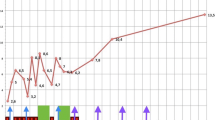Abstract
A 35-year-old woman diagnosed with multiple myeloma (IgG, λtype, stage IIIA) received an autologous peripheral blood stem cell transplant (PBSCT). She was euthyroid without autoreactive antibodies prior to the transplant. The patient complained of malaise, weight loss and low grade fever 1 month after transplant, despite rapid haematopoietic recovery. Thyroid function tests on day 34 revealed hyperthyroidism associated with anti-thyroid peroxidase antibody. Antinuclear antibody was also detected, and platelet-associated immunoglobulin was increased. These findings disappeared spontaneously by day 62 without treatment. Autoimmune diseases may occur transiently after autologous PBSCT.
Similar content being viewed by others
Author information
Authors and Affiliations
Rights and permissions
About this article
Cite this article
Ishikawa, F., Shigematsu, H., Gondo, H. et al. Autoreactive antibodies following autologous peripheral blood stem cell transplantation. Bone Marrow Transplant 22, 729–731 (1998). https://doi.org/10.1038/sj.bmt.1701409
Received:
Accepted:
Published:
Issue Date:
DOI: https://doi.org/10.1038/sj.bmt.1701409
- Springer Nature Limited
Keywords
This article is cited by
-
Severe autologous GVHD after hematopoietic progenitor cell transplantation for multiple myeloma
Bone Marrow Transplantation (2009)
-
Hyperthyroidism as a latent complication of autologous hematopoietic stem cell transplantation
International Journal of Hematology (2008)
-
Autoimmune thrombocytopenia following tandem autologous peripheral blood stem cell transplantation for refractory germ cell tumor
Bone Marrow Transplantation (2004)
-
Autoimmune thrombocytopenic purpura after autologous stem cell transplantation
Bone Marrow Transplantation (2003)
-
Development of rheumatoid arthritis following autologous peripheral blood stem cell transplantation
Bone Marrow Transplantation (2002)




